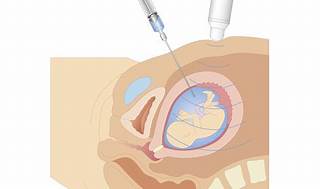A nurse is caring for a client who has a placenta previa.
Which of the following findings should the nurse expect?
Nausea.
Polyhydramnios.
Uterine tenderness.
Spotting.
The Correct Answer is D
The correct answer is choice D, spotting.
Placenta previa is a condition where the placenta implants in the lower part of the uterus, partly or completely covering the cervical opening.
This can cause painless, bright red vaginal bleeding, usually in the third trimester.
Spotting is a sign of placenta previa and should be reported to the provider immediately.
Choice A is wrong because nausea is not a specific finding of placenta previa.
Nausea can occur in normal pregnancy or in other conditions such as hyperemesis gravidarum or preeclampsia.
Choice B is wrong because polyhydramnios is not a finding of placenta previa.
Polyhydramnios is a condition where there is too much amniotic fluid in the uterus, which can cause complications such as preterm labor, cord prolapse, or fetal malformations.
Choice C is wrong because uterine tenderness is not a finding of placenta previa.
Uterine tenderness is a sign of abruptio placentae, which is a condition where the placenta separates from the uterine wall before delivery.
This can cause severe abdominal pain, dark red vaginal bleeding, and fetal distress.
Nursing Test Bank
Naxlex Comprehensive Predictor Exams
Related Questions
Correct Answer is A
Explanation
Answer and explanation.
The correct answer is choice A. A nontender, protruding abdomen is a normal finding for a 2year-old toddler. This is due to the immature development of the abdominal muscles and the relatively large size of the liver and kidneys in relation to the rest of the body.
Choice B is wrong because the head circumference should be equal to or less than the chest circumference by age 2. A head circumference that exceeds the chest circumference could indicate hydrocephalus or other neurological problems.
Choice C is wrong because the fontanels, or soft spots on the skull, should be closed by age 18 months. Palpable fontanels could indicate dehydration, malnutrition, or congenital disorders.
Choice D is wrong because the natural loss of deciduous teeth, or baby teeth, usually begins around age 6. Premature loss of teeth could indicate dental caries, trauma, or endocrine disorders.
Correct Answer is C
Explanation

Explore
The correct answer is choice c. Contractions.
Choice A rationale:
Epigastric pain is not a common complication following an amniocentesis. It is more often associated with conditions like preeclampsia or gastrointestinal issues.
Choice B rationale:
Hypertension is not directly related to amniocentesis. It is more commonly associated with conditions like preeclampsia or chronic hypertension in pregnancy.
Choice C rationale:
Contractions are a significant complication to monitor for after an amniocentesis, especially at 33 weeks of gestation. The procedure can sometimes induce preterm labor.
Choice D rationale:
Vomiting is not a typical complication following an amniocentesis. It may occur due to other unrelated reasons but is not directly linked to the procedure.
Whether you are a student looking to ace your exams or a practicing nurse seeking to enhance your expertise , our nursing education contents will empower you with the confidence and competence to make a difference in the lives of patients and become a respected leader in the healthcare field.
Visit Naxlex, invest in your future and unlock endless possibilities with our unparalleled nursing education contents today
Report Wrong Answer on the Current Question
Do you disagree with the answer? If yes, what is your expected answer? Explain.
Kindly be descriptive with the issue you are facing.
